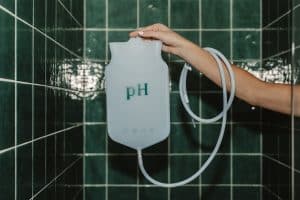Are stress and acne tag-teaming against your clear skin goals? Don’t worry, because a naturopathic approach has got your back! It’s all about addressing the underlying causes and giving your body the support it needs to heal naturally.
In the following sections, we’ll explore a range of naturopathic recommendations to help you effectively manage both stress and acne. These recommendations encompass personalised lifestyle changes, dietary modifications, functional testing, and the utilization of herbal medicine and supplements. By addressing the root causes, we’ll empower you to take control and conquer stress-related acne head-on.
So – let’s dive into some practical recommendations that can help you dial down the stress response and wave goodbye to those stubborn acne outbreaks. It’s time to reclaim your skin and restore your inner balance.
- Functional testing: Functional testing is regularly used to determine the cause of a condition. With acne, we may suggest specific blood tests, hormonal screening, cortisol testing, food intolerance testing, stool analysis, microbiome testing and anything else that may seem relevant based on your symptom picture.
- Exercise: Regular exercise offers multiple benefits for reducing stress and inflammation while promoting healthier skin. It enhances blood flow to the skin, which can contribute to improved acne. When dealing with chronic stress or adrenal fatigue, it’s essential to choose exercise that nourishes your nervous system and adrenals. Recommended activities include yoga, Pilates, strength training, and walking.
- Mindfulness: Incorporating mindfulness techniques, such as meditation and breathwork, into your daily routine can significantly reduce the stress response and manage high cortisol levels. These practices have been scientifically proven to lower cortisol and promote relaxation. By practicing mindfulness, you can reduce anxiety, improve mood, and develop a heightened awareness of your body and its needs. This increased self-awareness allows for healthier choices and effective stress management. Cultivating mindfulness is crucial for reducing cortisol’s negative impact, such as inflammation and hormonal imbalances, and creating a foundation for overall well-being. Dedicate time each day to these techniques to experience the profound benefits of mindfulness.
- Nutritional recommendations: A healthy diet is key to supporting your body’s natural healing processes and maintaining clear, radiant skin. Consider the following dietary tips:
- -Opt for low glycemic index (GI) foods: Choose carbohydrates with a low GI, such as whole grains, legumes, and non-starchy vegetables. These foods are digested more slowly, preventing rapid spikes in blood sugar levels that can contribute to acne breakouts.
- -Limit refined sugars and processed foods: Minimize your intake of sugary drinks, sweets, processed snacks, and fast food. These items can promote inflammation and exacerbate acne symptoms.
- -Increase omega-3 fatty acids: Incorporate omega-3 rich foods into your diet, such as fatty fish (salmon, mackerel), walnuts, chia seeds, and flaxseeds. Omega-3 fatty acids possess anti-inflammatory properties that can benefit acne-prone skin.
- -Stay hydrated: Ensure you drink plenty of water throughout the day to keep your skin hydrated and support overall skin health.
- -Include antioxidants: Emphasize antioxidant-rich foods in your diet, such as berries, leafy greens, and green tea. These foods are packed with beneficial compounds that help reduce inflammation and protect against oxidative stress, potentially benefiting acne-prone skin.
- Dairy products have often been linked to acne and hormonal issues, but why is this? There are several ways in which dairy can affect acne outbreaks. Hormonally, dairy contains hormones like IGF-1 that can stimulate the production of sebum (the skin’s oily substance) and cause skin cells to multiply more rapidly. This hormonal influence can contribute to acne development. Furthermore, consuming dairy can trigger inflammation, which can worsen existing acne symptoms and promote the formation of acne lesions. Inflammation is known to play a role in the persistence and severity of acne. Dairy products with a high glycemic index can also have an impact. These types of dairy products can cause a rapid increase in blood sugar levels and lead to spikes in insulin production. These insulin spikes can stimulate the production of oils in the skin and promote inflammation, both of which are associated with acne. In addition, some individuals may have allergies or sensitivities to milk, which can result in immune reactions. These immune reactions can cause inflammation and skin reactions similar to acne. It’s important to understand that not everyone will experience acne breakouts as a result of consuming dairy products. The relationship between dairy and acne can vary from person to person, and individual factors such as sensitivity or genetic predisposition may influence the outcome. If you suspect that dairy is contributing to your acne, you may consider reducing or eliminating dairy from your diet and observing any changes in your skin.
- Skincare: Using gentle, natural skincare products that are free of harsh chemicals can help support healthy skin and reduce inflammation. Look for products that contain natural ingredients like tea tree oil, aloe vera, gotu kola and chamomile. If you are finding that your skincare regime needs an upgrade, or that your skin barrier is damaged, talk to a skin specialist that can help get your skin topically where it needs to be.
- Supplements and herbal medicine offer valuable support for managing stress and promoting skin health. Here are some key options:
- -Ashwagandha: This adaptogenic herb has shown promise in reducing cortisol levels and enhancing stress resilience, making it a beneficial addition to stress management strategies.
- -Rhodiola: Another adaptogenic herb, Rhodiola, has been linked to improved mood, reduced fatigue, and decreased cortisol levels, providing support during stressful periods.
- -Magnesium: This essential mineral plays a role in regulating the stress response and can help reduce anxiety. Incorporating magnesium-rich foods like leafy greens, nuts, and seeds, or considering magnesium supplements, may be beneficial.
- -Omega-3 fatty acids: These essential fatty acids are vital for brain function and have demonstrated anti-inflammatory properties. Found in fatty fish such as salmon and sardines, as well as quality fish oil supplements, omega-3s can help reduce inflammation and anxiety.
- -Zinc: This essential mineral boasts anti-inflammatory and antioxidant properties. Studies have revealed that zinc supplements can decrease acne by reducing inflammation and sebum production, preventing pore blockage.
- -Probiotics: Beneficial bacteria residing in the gut can positively impact skin health. Probiotic supplements have been associated with reduced acne and improved overall skin condition.
- -Vitamin D: Known for its importance in skin health, vitamin D exhibits anti-inflammatory properties. Sun exposure is a primary source, but it can also be obtained from dietary sources and supplements, supporting a vibrant complexion.
- -Vitamin A: Highly beneficial for acne prevention, vitamin A regulates sebum production, supports healthy cell turnover, and reduces inflammation. By balancing oil production and promoting fresh cell formation, it helps prevent clogged pores and alleviates redness and swelling.
- -Antioxidants: Crucial for maintaining healthy skin, antioxidants combat inflammation, support skin repair, and shield against environmental stressors. By neutralizing free radicals, they contribute to clearer, more resilient skin. Including antioxidant-rich foods like fruits, vegetables, nuts, seeds, and herbal teas in your diet enhances these skin-enhancing benefits.
In conclusion, stress can be a significant contributor to acne, but there are natural ways to manage both. By incorporating naturopathic approaches like functional testing, exercise, mindfulness, a healthy diet, supplements, herbal medicine and gentle skincare routine, you can support your body’s natural healing processes and reduce the impact of stress on your skin.
Remember, everyone is unique, and what works for one person may not work for another. That’s why it’s crucial to reach out to a trusted naturopath to create a personalised treatment plan specifically tailored to your needs. We will consider your individual circumstances, health history, and symptoms to provide you with the most effective and personalised care.
Blog Post written by resident pH Clinic Naturopath Aimee Woods. Learn more by following Aimee on Instagram @aimeewoods_naturopath or via her website www.aimeewoods.com.au.


